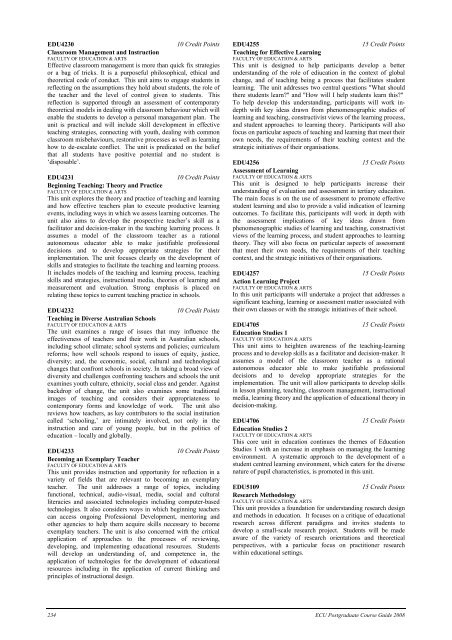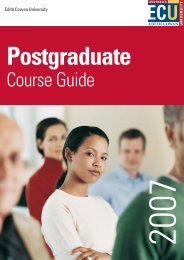Postgraduate - Edith Cowan University
Postgraduate - Edith Cowan University
Postgraduate - Edith Cowan University
You also want an ePaper? Increase the reach of your titles
YUMPU automatically turns print PDFs into web optimized ePapers that Google loves.
EDU4230 10 Credit Points<br />
Classroom Management and Instruction<br />
FACULTY OF EDUCATION & ARTS<br />
Effective classroom management is more than quick fix strategies<br />
or a bag of tricks. It is a purposeful philosophical, ethical and<br />
theoretical code of conduct. This unit aims to engage students in<br />
reflecting on the assumptions they hold about students, the role of<br />
the teacher and the level of control given to students. This<br />
reflection is supported through an assessment of contemporary<br />
theoretical models in dealing with classroom behaviour which will<br />
enable the students to develop a personal management plan. The<br />
unit is practical and will include skill development in effective<br />
teaching strategies, connecting with youth, dealing with common<br />
classroom misbehaviours, restorative processes as well as learning<br />
how to de-escalate conflict. The unit is predicated on the belief<br />
that all students have positive potential and no student is<br />
‘disposable’.<br />
EDU4231 10 Credit Points<br />
Beginning Teaching: Theory and Practice<br />
FACULTY OF EDUCATION & ARTS<br />
This unit explores the theory and practice of teaching and learning<br />
and how effective teachers plan to execute productive learning<br />
events, including ways in which we assess learning outcomes. The<br />
unit also aims to develop the prospective teacher’s skill as a<br />
facilitator and decision-maker in the teaching learning process. It<br />
assumes a model of the classroom teacher as a rational<br />
autonomous educator able to make justifiable professional<br />
decisions and to develop appropriate strategies for their<br />
implementation. The unit focuses clearly on the development of<br />
skills and strategies to facilitate the teaching and learning process.<br />
It includes models of the teaching and learning process, teaching<br />
skills and strategies, instructional media, theories of learning and<br />
measurement and evaluation. Strong emphasis is placed on<br />
relating these topics to current teaching practice in schools.<br />
EDU4232 10 Credit Points<br />
Teaching in Diverse Australian Schools<br />
FACULTY OF EDUCATION & ARTS<br />
The unit examines a range of issues that may influence the<br />
effectiveness of teachers and their work in Australian schools,<br />
including school climate; school systems and policies; curriculum<br />
reforms; how well schools respond to issues of equity, justice,<br />
diversity; and, the economic, social, cultural and technological<br />
changes that confront schools in society. In taking a broad view of<br />
diversity and challenges confronting teachers and schools the unit<br />
examines youth culture, ethnicity, social class and gender. Against<br />
backdrop of change, the unit also examines some traditional<br />
images of teaching and considers their appropriateness to<br />
contemporary forms and knowledge of work. The unit also<br />
reviews how teachers, as key contributors to the social institution<br />
called ‘schooling,’ are intimately involved, not only in the<br />
instruction and care of young people, but in the politics of<br />
education – locally and globally.<br />
EDU4233 10 Credit Points<br />
Becoming an Exemplary Teacher<br />
FACULTY OF EDUCATION & ARTS<br />
This unit provides instruction and opportunity for reflection in a<br />
variety of fields that are relevant to becoming an exemplary<br />
teacher. The unit addresses a range of topics, including<br />
functional, technical, audio-visual, media, social and cultural<br />
literacies and associated technologies including computer-based<br />
technologies. It also considers ways in which beginning teachers<br />
can access ongoing Professional Development, mentoring and<br />
other agencies to help them acquire skills necessary to become<br />
exemplary teachers. The unit is also concerned with the critical<br />
application of approaches to the processes of reviewing,<br />
developing, and implementing educational resources. Students<br />
will develop an understanding of, and competence in, the<br />
application of technologies for the development of educational<br />
resources including in the application of current thinking and<br />
principles of instructional design.<br />
EDU4255 15 Credit Points<br />
Teaching for Effective Learning<br />
FACULTY OF EDUCATION & ARTS<br />
This unit is designed to help participants develop a better<br />
understanding of the role of ediucation in the context of global<br />
change, and of teaching being a process that facilitates student<br />
learning. The unit addresses two central questions "What should<br />
there students learn?" and "How will I help students learn this?"<br />
To help develop this understanding, participants will work indepth<br />
with key ideas drawn from phenomenographic studies of<br />
learning and teaching, constructivist views of the learning process,<br />
and student approaches to learning theory. Participants will also<br />
focus on particular aspects of teaching and learning that meet their<br />
own needs, the requirements of their teaching context and the<br />
strategic initiatives of their organisations.<br />
EDU4256 15 Credit Points<br />
Assessment of Learning<br />
FACULTY OF EDUCATION & ARTS<br />
This unit is designed to help participants increase their<br />
understanding of evaluation and assessment in tertiary educaiton.<br />
The main focus is on the use of assessment to promote effective<br />
student learning and also to provide a valid indication of learning<br />
outcomes. To facilitate this, participants will work in depth with<br />
the assessment implications of key ideas drawn from<br />
phenomenographic studies of learning and teaching, constructivist<br />
views of the learning process, and student approaches to learning<br />
theory. They will also focus on particular aspects of assessment<br />
that meet their own needs, the requirements of their teaching<br />
context, and the strategic initiatives of their organisations.<br />
EDU4257 15 Credit Points<br />
Action Learning Project<br />
FACULTY OF EDUCATION & ARTS<br />
In this unit participants will undertake a project that addresses a<br />
significant teaching, learning or assessment matter associated with<br />
their own classes or with the strategic initiatives of their school.<br />
EDU4705 15 Credit Points<br />
Education Studies 1<br />
FACULTY OF EDUCATION & ARTS<br />
This unit aims to heighten awareness of the teaching-learning<br />
process and to develop skills as a facilitator and decision-maker. It<br />
assumes a model of the classroom teacher as a rational<br />
autonomous educator able to make justifiable professional<br />
decisions and to develop appropriate strategies for the<br />
implementation. The unit will allow participants to develop skills<br />
in lesson planning, teaching, classroom management, instructional<br />
media, learning theory and the application of educational theory in<br />
decision-making.<br />
EDU4706 15 Credit Points<br />
Education Studies 2<br />
FACULTY OF EDUCATION & ARTS<br />
This core unit in education continues the themes of Education<br />
Studies 1 with an increase in emphasis on managing the learning<br />
environment. A systematic approach to the development of a<br />
student centred learning environment, which caters for the diverse<br />
nature of pupil characteristics, is promoted in this unit.<br />
EDU5109 15 Credit Points<br />
Research Methodology<br />
FACULTY OF EDUCATION & ARTS<br />
This unit provides a foundation for understanding research design<br />
and methods in education. It focuses on a critique of educational<br />
research across different paradigms and invites students to<br />
develop a small-scale research project. Students will be made<br />
aware of the variety of research orientations and theoretical<br />
perspectives, with a particular focus on practitioner research<br />
within educational settings.<br />
234 ECU <strong>Postgraduate</strong> Course Guide 2008



